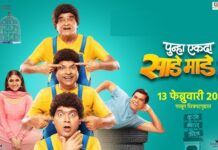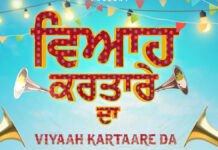| Pramod Films’ From Sydney With Love (UA) is a love story that starts in Sydney and ends in India. Raj (Prateek Chakravorty) and Rohit (Sharad Malhotra) study in Sydney. Megha (Bidita Bag) also joins the same educational institute and soon befriends them. As days pass, Rohit and Megha fall in love with one another. Raj loves Megha but she considers him as a good friend only. Lubaina (Evelyn Sharma) loves Raj.
At a party one day, another student, Suhail (Karan Sagoo), spikes Megha’s drink so that he can take her with him for the night. However, Rohit rescues Megha and the two, in a drunken state, end up sleeping together and having sex. Disgusted, Megha breaks off with Rohit and returns to India without completing her course. Soon, Rohit comes to India to apologise to Megha and woo her back. Accompanying him is his dear friend, Raj. In India, Rohit and Raj are witness to the tension in Megha’s house over the wedding of her sister, Sneha (Ranjani Chakravorty), with her boyfriend, Shantanu (Mithun Dweep). Megha and Sneha’s father (Sabyasachi Chakravorty) is against the marriage. The family is also passing through a financial crisis. The bigger shock for Rohit comes when Megha informs him that she is pregnant with his child. Rather than accept her in the state in which she is, Rohit develops cold feet and returns to Sydney. Raj, however, stays back and actually ends up solving the tensions and problems of the family. He even volunteers to marry Megha to save the family honour when she refuses to abort the child. What happens thereafter? Does Rohit return to India? Does he accept responsibility and agree to marry Megha? Does Megha opt for Rohit or Raj? What is Raj’s stance? Prateek Chakravorty’s story is childish and his screenplay, half-baked. For one, he has tried to break the stereotype by showing an unshapely and over-sized Raj as one of the romantic leads when the audience is used to seeing such characters in comic or sympathetic/sacrificing roles. Obviously, because this is done so casually, audience acceptance will be minimal. But this is not the only drawback of the script. Most of the comic and light scenes are hardly funny and they, therefore, fail to entertain. In fact, the farting scenes of Raj are so irritating that they are not funny at all. The track of Rohit not owning responsibility for his action of impregnating Megha, although in a drunken state, is so unworthy of a hero that the audience actually finds it too ridiculous to digest. Why Raj stays back in India once Rohit decides to leave is not clear. The writer has played it very safe by not really showing his intentions – whether Raj only wants to help the family or he sees Rohit’s exit as an opportunity to propose marriage to Megha. Again, Raj coming to the rescue of the troubled family, instead of Rohit, who is shown to be the hero of the drama, looks uncalled for. Another major flaw of the film is that the love story fails to touch the heart at any place. The viewer does not feel for a single character in the film. As a result, he is not bothered whether Megha unites with Raj or Rohit or neither of them. The romance is not at all heart-warming. Emotions fail to touch the heart. Comedy is weak. Dialogues (Prateek Chakravorty) are commonplace. Sharad Malhotra makes a confident debut on the big screen. He acts well. Bidita Bag fails to impress. She has a constant frown on her face – and if there isn’t a frown, there is a look of confusion as if she wasn’t sure of what she was doing. Prateek Chakravorty has a role bigger than he can handle. He is definitely not hero material. Karan Sagoo does an average job. Evelyn Sharma is so-so; her accent makes her dialogues difficult to comprehend. Ranjani Chakravorty performs ably as Sneha. Sabyasachi Chakravorty lends dignity to his character and does justice to his role. Uma Jaiswal is ordinary as the mother of Megha and Sneha. Reshmi Ghosh is fairly nice as Kol-di. Mithun Dweep is average. Master Bittu passes muster as Bhutkoo. Tapan Das hardly impresses as the servant. Prateek Chakravorty’s debut attempt at direction is barely passable. Had he not burdened himself with the task of writing too, he may have ended up narrating the film with some more finesse. Music (Sohail Sen and Brooklyn Shanti) is, perhaps, the best thing in the film. Although there is not a single hit song in the film, the numbers are at least ear-pleasing. Lyrics (Anvita Dutt, Kumaar and Prateek Chakravorty) are so-so. Song picturisations are routine. Sohail Sen’s background music could’ve been much better. Piyush Shah’s camerawork is alright. Sets (Rupin Suchak, Tapas Sarkar and Shirin Khan) are okay. Editing (by Antara Lahiri) ought to have been crisper. On the whole, From Sydney With Love will not get the love of the audience and will remain a non-starter after the terribly poor initial it has taken. Released on 31-8-’12 at Inox (daily 1 show), Metro Big (daily 2 shows) and other cinemas of Bombay by Pramod Films. Publicity: good. Opening: poor. …….Also released all over. Opening was weak everywhere. |




























